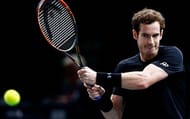One sunny afternoon on the lawns of Wimbledon in 2012 came Britain’s first gold in men’s tennis in more than a century. Andy Murray had finally come of age. Later that year, at the US Open, he became the first British since Fred Perry to win a Slam. It was the breakthrough season that catapulted him into the big league. He finally had something to show for his immense talent.
Fast forward to 2015. He has added only a Wimbledon title since, that too in 2013, and has only 11 masters title to his name. Compare that to the 10 Slams World No. 1 Novak Djokovic has won along with 26 masters titles and Murray’s record pales, especially for a player in the big leagues, one who was supposed to be the engineer of a change of guard in tennis.
Instead, the established order has remained pretty much the same, apart from the fact that Djokovic has reached the pinnacle.
What is it then that he lacks? He’s a physically sound athlete and has beaten all the other members of the Big Four in their prime: Federer in 2006, Nadal in 2010 and Djokovic in 2015. He is a tactically sound player, unrelenting on the baseline with a ferocious backhand, and doesn’t give opponents much room for error.
But his record against the big names tells a completely different story. His record against Nadal stands at 6-15, 11-14 against Federer and an embarassing 9-21 against Djokovic. Add to this the fact that he has won only 1 of his last 11 matches against the world no. 1, and you’ll sense that something is definitely wrong there.
So is the issue then the mental aspect?
For all its physicality, tennis is equally a mental battle – a brutal, unforgiving one. You are all alone on the court, your coaching staff, family, the crowd, everything behind the baseline. It’s just you and your opponent, slugging it out shot after shot that will eventually lead you to greatness. And that battle of nerves wins you the points that matter.
Murray took 5 Grand Slam finals to win his 1st Grand Slam. He has had an alarmingly barren run since his watershed Wimbledon victory in 2013. Although a regular feature in the semifinals, he fails to live up to his true expectations.
There seems to be a mental block when it comes to competing against the big names, especially Federer and Djokovic. The most recent match – the Paris Masters final against Djokovic, is a case in example. It was a worryingly routine loss for him. There was a sense of inevitability about the result. Uncharacteristic unforced errors and a lack of accuracy meant he was well short of Djokovic.
By his own assessment, after another loss in the Paris final, he needs to improve against the big players, especially his top 2 competitors.
Under Ivan Lendl, he transformed into a winning machine, but after his back surgery in late 2013, we have only witnessed sparks of brilliance from the Scot.
“Since the beginning of last year, my results against him and Roger, from my perspective, haven’t been good enough,” said Murray.
“They are two of the greatest players of all time, so it’s not like there is any disgrace in losing to them. But I do feel like I need to start doing better in those matchups, because the scoreline in the last couple of matches hasn’t been good. I need to think about why that is and what I can do to turn it around.”
Murray has long remained in the shadows of his old friend, ever since they became professionals. He was No. 4 when Djokovic was 3rd – ranked during the Swiss-Serbian domination. True, the injury may have hindered his rise to his peak, but a lacklustre 2015 by his standards has once again raised doubt on his big match performances.
For long, he has been part of the Big Four. It’s high time he delivers the trophies. At 28, fast approaching 29, Murray is fast running out of time.
